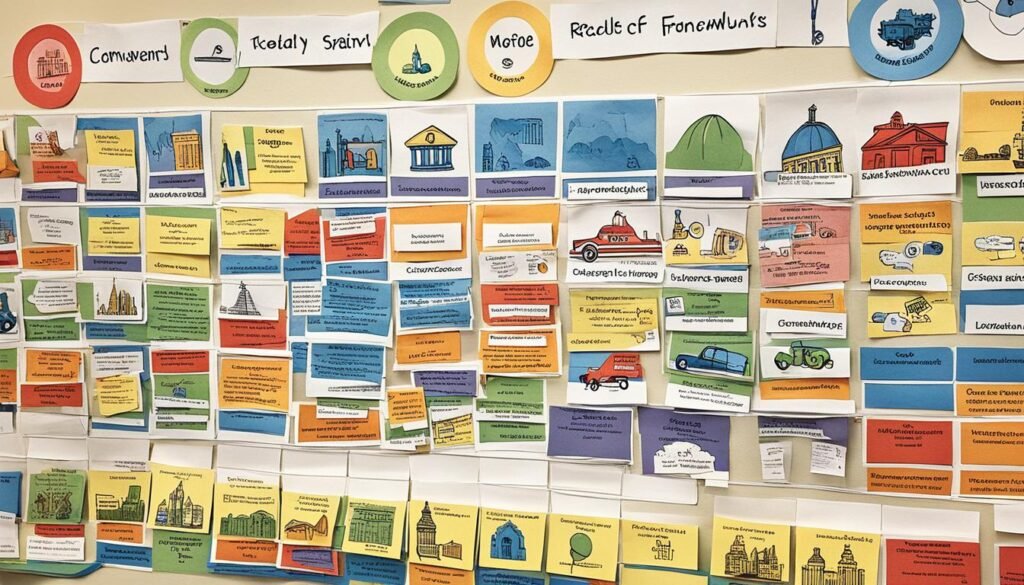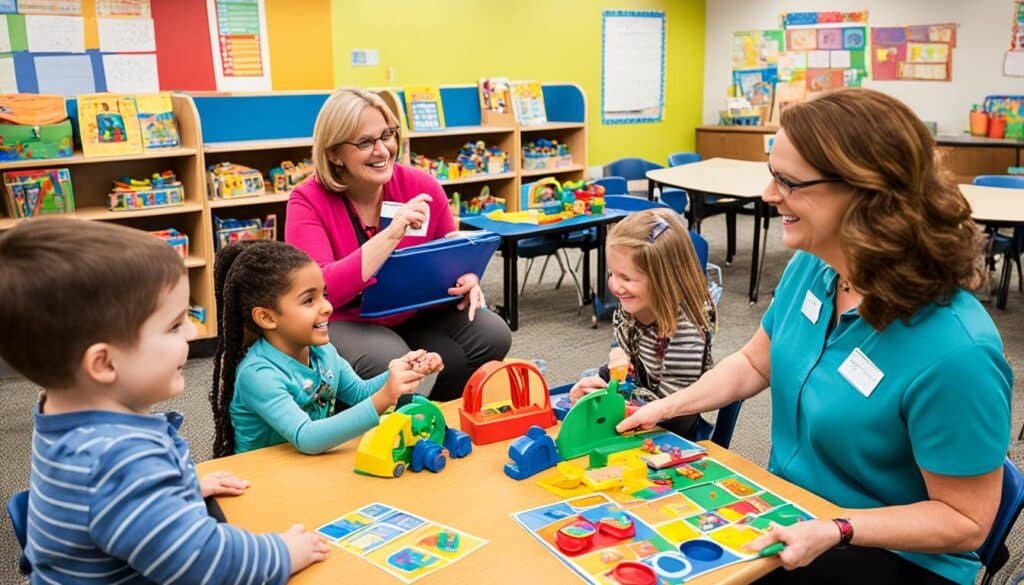Early Childhood Special Education (ECSE) is a program designed for children with disabilities aged 3-5. It provides a free appropriate public education (FAPE) thanks to the Individuals with Disabilities Education Act (IDEA). This is in the least restrictive environment (LRE) based on the child’s needs.
Children meeting the eligibility criteria can get services in places like a pre-kindergarten classroom, their home, or in community settings like Head Start and pre-school. In Texas, these services are free for those eligible. Each year, more than 40,000 children in Texas benefit from individual special education services offered under IDEA 619 Preschool.
Also Read: Master Of Arts In Educational Administration Higher Education
Key Takeaways
- Early Childhood Special Education (ECSE) is a state and federally mandated program for young children with disabilities ages 3-5.
- Eligible children with disabilities are entitled to receive a free appropriate public education (FAPE) under the Individuals with Disabilities Education Act (IDEA).
- ECSE services can be provided in a variety of settings, including pre-kindergarten classrooms, homes, and community settings.
- In Texas, ECSE services for eligible children with disabilities ages 3-5 are provided free of charge through the public-school system.
- Over 40,000 children in Texas receive individual special education services each year as part of IDEA 619 Preschool.
Also Read: The Influence Of Latin Legum Magister On Modern Legal Terminology
Understanding Early Childhood Special Education (ECSE)
ECSE programs help infants, toddlers, and preschool children with disabilities. They and their families get needed support. Under IDEA, they have two main parts:
Part C supports infants and toddlers from birth to two years. Part B/619 helps children ages 3 to when they start kindergarten. Each child is checked to see if they should get ECSE help.
Also Read: Master Of Arts In Journalism And Mass Communications In Professional Journalism
Definition and Overview
ECSE programs give special help to young kids with disabilities. This includes talking to teachers, helping the children directly, and teaching about their needs. The main aim is to make sure these children with disabilities get a good education.
Also Read: Agricultural Sciences And Natural Resources
Eligibility Criteria
To get ECSE help, kids go through a detailed check. They must meet the state’s eligibility criteria for disabilities in early childhood programs. This can be for many reasons like delays in development, trouble seeing or hearing, or physical issues. These problems should make learning hard.
Also Read: Building Blocks For Success: Career Education System Strategies
Types of Disabilities Covered
ECSE programs help a big variety of children with disabilities. They work with kids who are behind in speaking, to those with bigger challenges like autism or emotional needs. The special education offices team up with schools, child care, and Head Start to help kids aged 3 to 5.
Legal Framework and Policies

In the United States, we have a strong legal system for the education. It’s mainly covered by the Individuals with Disabilities Education Act (IDEA). This act assures that between 3-5 years old get a , which stands for free appropriate public education. They receive this in the , or least restrictive environment, which is best for their learning.
Individuals with Disabilities Education Act (IDEA)
The is a key federal law. It says that with disabilities get and related services from birth to age 21. IDEA’s Part B focuses on and directs districts to find, check, and help these kids.
Free Appropriate Public Education (FAPE)
Under IDEA, kids who qualify have the right to a . This includes special teaching, other services, and things that help them learn better. A helps these get ready for more school, jobs, and living on their own.
Least Restrictive Environment (LRE)
IDEA also wants kids to learn in the . That means placing them where they can meet and learn with kids who don’t have disabilities too. This idea promotes joining kids together no matter their abilities. It helps both groups grow.
Services and Support Systems

The Early Childhood Technical Assistance Center (ECTA) is key in helping with early childhood services under the Individuals with Disabilities Education Act (IDEA). Their goal is to improve service systems for children from birth through age five who have disabilities. They make sure these kids and their families get the right, helpful, and culture-focused support and services.
Early Intervention Services
Part C of the IDEA requires early intervention for babies and toddlers up to age two with developmental needs. Every family gets a plan that fits their child, aiming to help kids grow well and get ready for preschool special education. This is part of preparing them for preschool special education services under Part B/619.
Special Education and Related Services
The Texas Education Agency (TEA) looks after special education for kids ages 3 to 5 under Part B/619 of the IDEA. It ensures these young ones with needs get a free appropriate public education (FAPE) in the least restrictive environment (LRE), through public schools.
Individualized Education Programs (IEPs)
Special education kids ages 3 to 5 have their own Individualized Education Program (IEP). This plan figures out the education and other help they need, based on what each child is good at and needs work on. It’s a team effort to make sure the kids’ unique qualities are taking into account, helping them get better and fit in at school.
Inclusion and Early Childhood Settings
Making sure that young children with disabilities can join inclusive early childhood programs is crucial. School districts and early intervention services focus on this. They work to include these children in community-based programs and Head Start initiatives. This way, they get the special early education services they need. They also learn and interact with other kids their age.
Inclusive Classroom Practices
Many districts in Wisconsin are improving inclusive classroom practices for young kids. For example, the Sun Prairie Area School District shows how early childhood inclusion is common. This happens in schools and community-based programs. Teachers and staff get trained in ways to help all kids join in, engage socially, and learn in ways that fit them best. This includes kids with disabilities or developmental delays.
Community-Based Programs
Besides schools, children with disabilities also get help from community-based programs like daycares, preschools, and Head Start. These places let young children with disabilities be with other kids and learn with them. They also give special help based on each child’s needs and what they’re eligible for.
Head Start and Preschool Programs
Head Start and other preschool programs are very important for children with disabilities. They work closely with schools and early intervention services. Their goal is to give all kids the education and support they need. They also help kids be part of the fun and learning in these community-based programs.
Childhood Special Education

Looking for info on child development and Early Childhood Special Education supports for kids aged 0-5? Help Me Grow Minnesota is a top pick. The Minnesota Department of Education team focuses on Early Childhood Special Education. They help schools meet special education requirements.
Early Identification and Screening
The state early identification program is key. It helps children with disabilities ages 3-5 get needed services early. They check if kids are eligible to receive support. This help can happen in community settings.
Developmental Assessments
Eligible children may undergo detailed assessments. These look for developmental delays and decide on a program. This way, each child gets the right special education services. Such assessments are part of the IDEA 619 preschool process.
Transition Planning
Moving from early to preschool services is a big step for children with disabilities ages 3-5. Good transition planning is crucial. It ensures a smooth change and service continuity. The process involves families, providers, and school districts.
Family Involvement and Support

Families are a key part of early childhood special education (ECSE). Their involvement is vital for kids aged 3 to 5 with disabilities. They support the growth and learning of these children.
Parent-Professional Partnerships
The Wisconsin Departments of Children and Families (DCF) and Public Instruction (DPI) work together on a memo. It helps answer questions about background checks and the new Head Start Program Performance Standards. The memo stresses the need for strong parent-professional partnerships to help children with special needs.
Family-Centered Practices
The Wisconsin Early Childhood Collaborating Partners website is a hub for info. It covers topics like state initiatives and the best family-centered practices for early childhood settings. This site encourages bringing families into the education process as valued contributors.
Resource and Support Networks
Besides what schools offer, families can find more help for children who need special education. They can get support from federal, state, and local groups. These groups give info, training, and links to services for kids with special needs.
Professional Development and Best Practices
The Early Learning Technical Assistance and Implementation (EL-TAI) grant offers help for teachers and groups in Wisconsin. It’s free and aims to improve preschoolers’ education with IEPs. The grant gives both training and hands-on help to these children.
Early Childhood Special Education Teachers
The Early Childhood Special Education (ECSE) email list keeps teachers and staff updated. They learn about the best ways to help children ages 3-5 with disabilities. This is for those who provide ecse services, and it won’t cost anything if the child is eligible.
Interdisciplinary Collaboration
Collaboration is key. It brings together special education team members, teachers, and others to support children ages 3-5. This teamwork ensures every child gets the care and education they need. It follows a family-centered and fact-driven approach.
Evidence-Based Interventions
The division of early learning focuses on what works best for children ages 3-5 with disabilities. This means using methods that research shows to be effective. Examples include ways to include all kids, technology that helps, and steps to encourage good behavior. This work helps every child is eligible reach their learning goals.
Early Childhood Special Education Programs
The Wisconsin Department of Public Instruction (DPI) is key in helping early childhood special education (ECSE) programs in the state. They provide lots of resources and advice to different organizations. These include state and local education groups, public schools, and groups that help kids from 3 to 5 years old with special needs.
State and Local Education Agencies
The DPI helps by giving info on how regular teachers can be part of a kid’s special education plan—and guides them through some necessary forms. They also lead the Early Childhood Technical Assistance and Implementation Project (EC-TAI). This project offers learning and help for those who work in early childhood special education.
Public School Districts
Public schools are essential in providing help for kids in their communities aged 3 to 5 who need special education. They join forces with the DPI to follow federal and state laws. They also use methods that have been proven to be good for education and the growth of children.
Community-Based Organizations
Not just schools, but other community groups, like Head Start, daycares, and services for early health, also work with the DPI and schools. They provide services from the birth of a child through age five for those with special needs. These efforts make sure all kids who qualify get plans, support, and technology to help them succeed.
Altogether, the Wisconsin Department of Public Instruction, along with many others, works hard. They make sure kids with learning needs and special needs get the best early education services. This includes help with how they behave, plans for moving to other schools, and understanding behavior to best teach these kids.
Also Read: Advance Your Career With Medical Coding Course Online
Conclusion
Early Childhood Special Education (ECSE) is vital for kids who need help. It’s for those with disabilities or who are behind in development. The program runs from birth to when kids are five years old. Laws like the Individuals with Disabilities Education Act (IDEA) make sure these kids get a good education for free in the best place possible.
ECSE gives many different kinds of help. This includes starting early, educating specifically for the child’s needs, and setting goals for each child (IEPs). The aim is for children to join in with other kids in places like Head Start. For ECSE to work well, parents need to be involved, teachers need to learn more, and the approach should be based on what works best.
Learning about the rules, what help is available, and how to give the best support is important. It helps teachers, parents, and others help kids with special needs grow and be part of things. When everyone works together, children in ECSE can do their best and feel included.
FAQs
Q: What is early childhood special education?
A: Early childhood special education is a program designed to provide specialized services to children with disabilities in the early stages of their development, typically between the ages of 3 to 5.
Q: How are children with disabilities in early childhood identified for special education services?
A: Children with disabilities in early childhood are identified for special education services through assessments conducted by professionals in the field, such as the local school district’s special education team.
Q: What is the role of the Office of Special Education Programs in early childhood special education?
A: The Office of Special Education Programs (OSEP) plays a key role in overseeing and providing guidance on early childhood special education services at the national level.
Q: Can children with disabilities receive early childhood intervention services?
A: Yes, children with disabilities can receive early childhood intervention services to address their individual needs and support their development in various areas.
Q: What is Part C of the special education process?
A: Part C of the special education process refers to the early intervention services provided to infants and toddlers with disabilities from birth up to age 3, as part of the Individuals with Disabilities Education Act (IDEA).
Q: Where can I find more information about early learning for young children with disabilities?
A: You can access information about early learning for young children with disabilities through resources provided by organizations such as the Division for Early Childhood and the National Association for the Education of Young Children.
Q: Are young children with disabilities eligible for free and appropriate public education?
A: Yes, young children with disabilities are eligible for free and appropriate public education under federal law, which includes access to early childhood special education services tailored to their individual needs.





